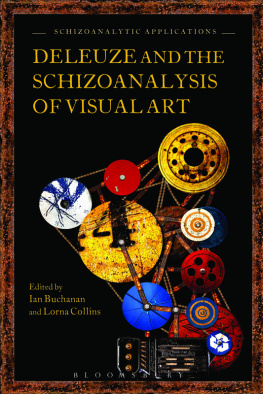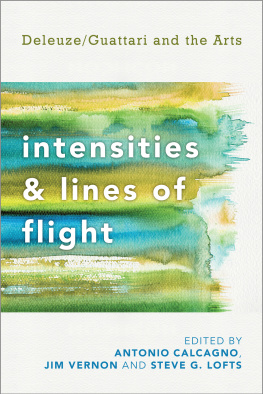A volume in the SUNY series in Gender Theory
Tina Chanter, editor
Deleuze and Guattari's
Immanent Ethics
Theory, Subjectivity, and Duration
TAMSIN LORRAINE
Published by State University of New York Press, Albany
2011 State University of New York
All rights reserved
Printed in the United States of America
No part of this book may be used or reproduced in any manner whatsoever without written permission. No part of this book may be stored in a retrieval system or transmitted in any form or by any means including electronic, electrostatic, magnetic tape, mechanical, photocopying, recording, or otherwise without the prior permission in writing of the publisher.
For information, contact State University of New York Press, Albany, NY
www.sunypress.edu
Production by Diane Ganeles
Marketing by Anne M. Valentine
Library of Congress Cataloging-in-Publication Data
Lorraine, Tamsin E.
Deleuze and Guattari's immanent ethics : theory, subjectivity, and duration / Tamsin Lorraine.
p. cm. (SUNY series in gender theory)
Includes bibliographical references (p. ) and index.
ISBN 978-1-4384-3663-0 (hardcover : alk. paper)
1. Deleuze, Gilles, 19251995. 2. Guattari, Flix, 19301992. 3. Ethics. 4. Feminist ethics. I. Title.
B2430.D454L67 2011
194dc22 2011003167
10 9 8 7 6 5 4 3 2 1
Preface
The reading I give here of Gilles Deleuze and Flix Guattari's conceptions of theory, subjectivity, and ethics is inspired by Deleuze and Guattari's innovative approach to two problems with which I have struggled throughout my adult life. The first problem is that of how to be ethical in an age where traditional approaches to grounding transcendent values in God or reason appear to be increasingly suspect, and the second problem is that of how to conceive of the practice of philosophy in a way that manifests its pragmatic importance to living as well as the aesthetic pleasure it can bring to its practitioners.
As a woman and a feminist who came of age in the 1970s, I was drawn to philosophy for its skeptical attitude; it was by taking a philosophical step back in order to reconsider the assumptions informing my conceptions of truth and ethics that I was able to rethink what I had been told about what it meant to be human or what we could hope for as human beings struggling to live with one another in productive harmony. This critical endeavor gave me important tools in investigating and analyzing reality in light of human subjects marginalized in various ways from the mainstream and opened my eyes to more inclusive ways of conceiving what it meant to be human and how we might better work toward a society that could support our collective humanity. My love of philosophy has thus always had a pragmatic edge to it that spoke to my need to resolve the dissonance I experienced in trying to live ethically as I faced particular life problems (Why did the right thing sometimes feel so wrong? To whom could I turn for answers when neither specific authority figures nor rational argument could supply completely satisfying solutions?). Deleuze and Guattari's emphasis on a pragmatic conception of language always implicated with the situations of embodied subjects of a particular time and place responding to specific problems along with a conception of human beings as evolving creatures struggling to unfold their capacities to live in always novel circumstances in response to life conceived as becoming, spoke to my need to take an ethical approach more creative than that of applying moral rules or transcendent idealsan approach that was more attuned to the skewed perspectives of embodied subjects facing unanticipated and even unintelligible (at least according to normal or acceptable ways of understanding social reality) dilemmas.
Deleuze and Guattari's conception of philosophy not only spoke to the way philosophy has enabled me to resolve some of the dissonance of day-to-day living, it also captured the aesthetic pleasure I often derive from the unexpected perspectives arrived at by unfolding lines of thought I would never have otherwise traveled. It has been one of the great pleasures in my years of teaching philosophy (as well as one of my great frustrations when, as I often do, I fail) to communicate to my students the inherent joy of carefully pursuing the intricacies of the webs of beliefswith all their implicit nuance and affective chargethat structure the meaning of our lives. Deleuze and Guattari's conception of philosophy as a form of thought that creates concepts through a principle of consistency unfolded in attentive pursuit of the nuances of the meaning of concepts in relation to other concepts, not only gave me a way of understanding the pleasure practicing philosophy gives me, but a way of reading philosophy that opens up the unexpected perspectives it can create rather than closing them off as often happens when we, as we all to often do, become more entrenched in marking territory than pursuing ideas.
In my reading of Deleuze and Guattari I not only attempt to present conceptions of an immanent ethics and philosophy as the creation of concepts that are drawn as consistently and rigorously from a reading of their concepts as I can manage, but I also have attempted to enact the conception of philosophy that I draw from their work: an approach that emphasizes the rigor and creativity philosophy can contribute to cultural debates without ever losing sight of our ongoing and embodied immersion in a world to which we must respond. In that spirit, I have refrained from engaging in debates of interpretation and instead deliberately chosen to take from Deleuze and Guattari as well as the secondary commentaries that have inspired me in the pursuit of this particular project what speaks to the pragmatic concerns of individual human beings wondering, from their very specific locations, how to live ethical lives. In doing so, I have, I hope, not only shared some of these implications, but also some of the joy of carefully working through some of their concepts in light of such implications. I thus hope not only to suggest an innovative approach to ethics that I believe could speak to some of our current ethical impasses, but also to introduce some of my readers to the pragmatic and even aesthetic pleasures, as they are described and enhanced by Deleuze and Guattari's characterization of the process of philosophical thinking, of what might at times seem to be the overly careful approach of the philosopher to a set of texts.
The view of philosophy I develop and enact here suggests that multiple theories from multiple locations can and should be read in light of situated problems in order to encourage the cross-fertilization of productive connections. I have accordingly made some connections between Deleuze and Guattari's work and work that is not inspired by a DeleuzeGuattarian perspective in order to draw out implicit tendencies in both that provoke new insights into ethical forms of being-human. I present my reading of Deleuze and Guattari from the perspective of my own lived experience as a woman and a feminist philosopher with the specific investments of my location and I exemplify my reading as vividly and forcefully as I can through the problems and examples that I draw from that location. I do not mean (nor do I expect) that my own trajectory through the work of Deleuze and Guattari should be taken as an exhaustive rendering of the use of Deleuze and Guattari for an immanent ethics or feminism, or even that some of the positions I elaborate in light of my interests and location will necessarily coincide with that of other ethical or feminist perspectives inspired by their work. In fact, it is part of the understanding of philosophy that I derive from Deleuze and Guattari's work that different readings should instigate different counter-effectuations of the philosophical concepts that may be brought to bear on the problems of specific locations. I hope to follow in the footsteps of readings of Deleuze and Guattari given in books like Rosi Braidotti's














